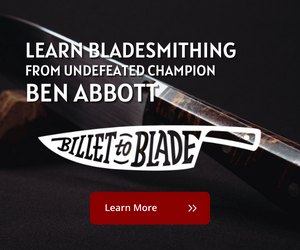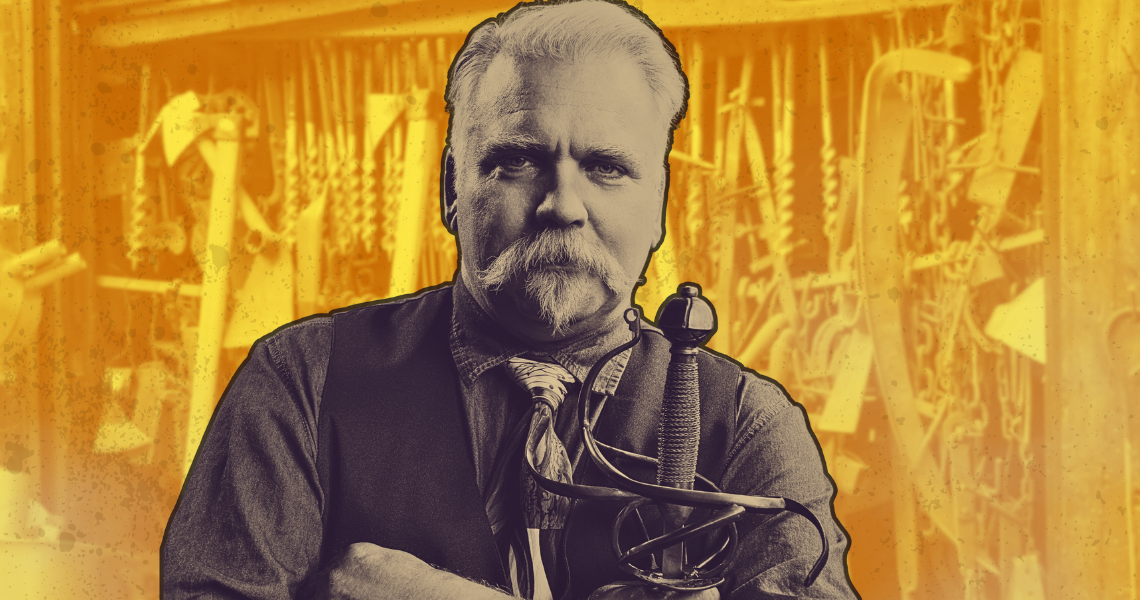Forging With Faith: Q & A with Forged In Fire "Supersized" Champion Ian Zimmerman
Ian Zimmerman is the bladesmith, jeweler, and owner of Ian Z Knives and Jewelry in Bedford, Pennsylvania. Late last year, Ian earned the title of Forged in Fire champion with his Japanese Great Sword. Besides being an avid forger, Ian is also a student, collegiate athlete, and rock climber.
RELATED: WHERE TO STREAM AND WATCH FORGED IN FIRE
With all the different “hats” Ian wears, he’s understandably a busy guy! We weren’t able to connect face-to-face with Ian but, fortunately, he was able to find time to answer some of our most burning questions via email. He wrote about his time on the show and shared a wealth of advice for other bladesmiths.
(Image credit: History)
BRUTE de FORGE: How did you get into forging and bladesmithing?
Ian Zimmerman: I have been bladesmithing for almost three years, though I have been interested in knives and swords since childhood. I was in Boy Scouts and was able to experience the utility purpose of a knife, and I have since valued it as an essential daily tool.
My dad is a carpenter, and he and I would create knives from old saw blades and such when I was little. We would make wooden swords together; he would make them, and I would watch and ‘direct’ him. But I loved Lord of the Rings, Chronicles of Narnia, etc., and my dream job has always been to create weapons and props for movies like those. In April 2020, having spent a great deal of time on the couch in quarantine, I ran across some of Alec Steele’s videos. I have also watched the show Man at Arms since I can remember, and I loved the idea of bladesmithing. There was something spectacular about it. I was an artist already, though I spent my time drawing and doing hyperrealism pieces for people in my town. Anyways, I set out to create a sword using only wood. I used maple and walnut. I loved the process and felt like a real bladesmith. My dad came home from work, and he looked it over. I said, “After spending that much time on it, I wish it was metal.” He replied that our neighbor and friend, Jake Hall (Fort Piper Forge), could help.
“Don’t compare yourself with other makers! A parallel with many areas of life, the grass isn’t always greener.”
Ecstatic, I agreed, and that weekend we went and saw Jake, who kindly lent me a small anvil and some tools to try and get started. Like most smiths, I made my first forge from an old toolbox and a hairdryer and started hitting metal the next morning. From there, I just started experimenting with stuff. I have been a smith for about three years now.
BDF: Can you explain your experience in becoming a competitor on Forged in Fire? Did you apply, or did they reach out to you?
IZ: So, I actually applied for Season 8 of the show in the summer of 2021. However, I never heard anything back, and having college and athletics start back up in the fall, the show slipped out of my mind. I was on my way to study hall one evening in the fall when I got a call. It was a lengthy and, to be honest, very nerdy conversation. The man who called was a casting recruiter for the show and mentioned he saw that I applied. He informed me that the application I had done was for the previous season, and he strongly encouraged me to reapply for Season 9. Hesitant because of the responsibility with school, I said that it wouldn’t be possible, but he continued to urge me onward. In hindsight, I’m very thankful for this because I wouldn’t have continued the process without his support or interest.
I went through several interviews and lots of applications until around Christmas. I didn’t hear anything until early April. I assumed that I hadn’t been selected and had, once again, let it slip from my mind. Then one day, walking with my fiancée to practice at school, I got a call that they wanted me the following week. I was ecstatic and agreed after checking with my coach and professors!
BDF: Did you do much to prepare for the show?
IZ: I really didn’t, which is funny in hindsight. Most forging is muscle memory, but I had not forged it in several months. I went on the show with the frame of mind that I would do my best and trust that the Lord would let it work out however it was supposed to. I knew I would learn a lot and enjoy the experience no matter what, so that was my aim going into it.
“I went on the show with the frame of mind that I would do my best and trust that the Lord would let it work out however it was supposed to.”
BDF: Was there anything that you were particularly worried about having to make in competition on the forge floor?
IZ: I wasn’t too worried about anything specific. I didn’t allow myself to be. I knew that it could hold any number of challenges, so I just approached it with the mindset that I would face it and give it my best shot at that moment. I’d be lying if I said I wasn’t scared, though! Going to the show, I had almost an eight-hour car ride to think about all scenarios as I drove. I cried a bit, not because of fear but because of the idea that I was doing something that I didn’t think I would ever get to do. But there was just so much peace going into it, knowing that I had the Lord with me and that it would be ok no matter what happened.
BDF: Were there any behind-the-scenes things you found interesting?
IZ: Overall, the behind-the-scenes stuff wasn’t too incredibly exciting—basically, long hours of talking with the other smiths and the crew in the room with us. I loved getting to know Austin, Rob, and Jason. They were awesome guys and made the experience much more fun. Although it was a competition, it didn’t feel hostile or unfriendly in any way, which was amazing. It felt more like a bunch of dudes trying to create something crazy!
BDF: Was the experience what you expected it to be?
IZ: I didn’t have many expectations going in. I just wanted to enjoy it; I was not disappointed!
BDF: How was having the camera crew at home filming for the final round?
IZ: Having a film crew at my house was pretty awesome; I met Kenn and Jack, the Film guy, and Producer, respectively. They were terrific, and I truly loved spending that time with them, documenting the process. I loved round three, mainly because of the challenge given to me, and it was just incredible being able to document it at my home forge like that.
(Image credit: Ian Zimmerman)
BDF: Because it was so large, you had to dig a trench to forge your sword properly. Was that something that you had done before?
So, I had done that before, although more so when I was just starting out with a coal forge. It is an excellent method for doing longer swords like that, but I still prefer propane because of its convenience.
BDF: Have you seen an increase in business since your episode aired?
IZ: I have, although I tend not to do custom orders so much because I already have to juggle school and work, so I’ve turned away a lot of customs. It has certainly made things easier to sell, however!
BDF: What do you do when you aren’t forging blades and creating jewelry?
IZ: I am a Christian, distance runner/college athlete, artist, fiancé, college student, rock climber, and jeweler. I have too many hobbies! But in all of it, I love making stuff and giving my best effort.
BDF: Can you tell us about being a jeweler? Did you decide to become a jeweler and then get into blade smithing or vice versa?
IZ: I was a bladesmith first, and then, via my fiancée, I was introduced to jewelry work. Being a jeweler has many parallels with bladesmithing. I work as an intern for a local, family-owned jewelry business and take courses at school for the trade. I have enjoyed it, and it is an art platform similar to making blades. One thing that excites me about the jewelry trade is the merger of the two concepts. Imagine what a beautiful mosaic-Damascus knife would look like, paired with emeralds or a gold inlay! The possibilities are endless!
BDF: Do you have any advice for other bladesmiths out there?
IZ: First, don’t compare yourself with other makers! A parallel with many areas of life, the grass isn’t always greener. Other makers were just like you, and they started somewhere. Don’t let them or anyone else make you feel like you can’t be on “that” level. Just make things from your heart and appreciate them for what they are: a piece of your artwork. There is no right or wrong way of doing art; art is a subjective area of life, so make it and love it. Stop thinking about a project and just start! I always start with the blade and work one piece at a time to completion!
“I love making stuff and giving my best effort. ”
Secondly, have eyes that are bigger than your hands! Don’t limit yourself to what you think is possible. Look at a skill or technique you don’t know yet and do it. Too often, smiths find grooves, and they stay in them for their entire careers, and I think it hinders them from standing out.
You don’t need fancy tools or a big workshop to make stuff. Craftsmen always find a way! Also, there’s almost always more than one right way to do something. Find what works for you and go with it!
In the words of Jon Bellion: “I don’t have to do anything that I don’t want to do.” Make things and projects that excite you and that you are completely behind. Custom orders are great, but at the end of the day, don’t do it for money. Do it for the satisfaction and because it excites you. That’s the only way to do this long-term in my book. A good project is one that you have to force yourself away from at night. It’s like a good book that you can’t put down. Be passionate about it and enjoy the process. You will spend hours upon hours making this stuff. If you hate the process, you are wasting your time. I sometimes find it hard to say a project is complete because I don’t want it to be finished. I’m usually not chasing the end result, but I’m enjoying the path it takes to get there.
“Too often, smiths find grooves, and they stay in them for their entire careers, and I think it hinders them from standing out. ”
Lastly, hard work beats talent when talent doesn’t work hard. Yes, there are talented artists out there, and you may think you’ll never be that good, but you can be. Some of the best artists and successful people aren’t just talented, but through time and a number of failures, they’ve persevered and created a skill set that others don’t have. So, start forging yourself and your craft into whom you want to be.
You can check out Ian’s championship performance on Season 9 Episode 26 of Forged in Fire. To see more of Ian’s work, follow him on Instagram @ianz_knives or Facebook @ianzknives.
About The Author
More Interviews





















